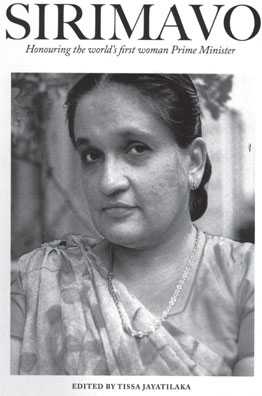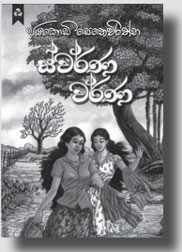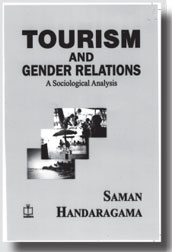|

Tribute to a shining star in the political firmament
Reviewed by Indrajith Coomaraswamy
Sirimavo Bandaranaike was a dominant figure for much of Sri Lanka's
post-Independence history. For four decades, she was at the heart of the
country's politics. The world remembers her as the first woman Prime
Minister. It is entirely fitting, therefore, that there should be a
Commemorative Volume honouring both this achievement and her
distinguished political career. The editor and sponsors of this volume
have been successful in mobilising a cast of contributors of the highest
calibre and eminence, a number of whom worked very closely with her.
They are to be commended for producing a volume that is not merely a
hagiography. Instead, it offers a much dispassionate analysis of her
life and times.
 |
|
SIRIMAVO
Honouring the world’s first woman
Prime Minister
memoirs, photographs and key speeches of
Mrs. Bandaranaike
Published by
The Bandaranaike Museum Committee |
A common thread that runs through the whole volume, particularly the
memoirs of those who worked closely with her, is that Mrs Bandaranaike
was a woman with personal characteristics of the highest quality. These
were reflected in her multiple roles as wife, mother and national
leader. Her integrity, sincerity, caring nature, courtesy and strong
sense of duty are acknowledged by all. There is also consensus that the
manner in which she conducted her foreign policy provides an exemplary
template for a country with Sir Lanka's geopolitical realities.
On domestic matters, the Volume brings out a much more mixed record.
This was probably inevitable, as Mrs Bandaranaike was centrally caught
up in a turbulent post-colonial history marked by a confluence of social
and economic trends that have resulted in two youth insurrections and a
separatist conflict. The politics of handling these historic forces have
hitherto proved too challenging for all of Sri Lanka's leaders. A number
of the contributions allude to the fact that well-intentioned policies
resulted in perverse outcomes because the overall landscape, both
domestic and external, was often complex and difficult.
Personality
In reviewing this Volume on a thematic basis, one can start by asking
the question: What kind of person was the world's first woman prime
minister? Here, Dharmasiri Peiris' personal memoir and Bradman
Weerakoon's tribute provide the perspectives and insights of two people
who worked extremely closely with her as her Secretary.
Pieris recalls her visible growth in stature and maturity while in
office, as well as her increasing self-confidence and the capacity "not
to be hustled or intimidated" even by the formidable figures,
particularly in her second Cabinet (1970-77). He also points out that
she valued the advice of bright and experienced persons, but ultimately
she made the decisions. In addition, Peiris shares the valuable insights
of an insider on her approach to work.
Peiris also records his appreciation of her understanding of the role
of public servants and her scrupulous avoidance of requesting them to
engage in any party political activity. While Mrs Bandaranaike's
personal conduct was exemplary in this respect, Jayampathy
Wickramaratne, in his article on the 1972 Constitution, points that "the
entire public service was placed under the control of the political
executive, eroding the independence it enjoyed." He points out that this
was the outcome of a policy intended to reduce the capacity of the
bureaucracy to obstruct decision-making and perpetuate the status quo.
The disconnent between Mrs Bandaranaike's extremely high personal
standards and the actions of her governments is a recurring theme.
Insight
Bradman Weerakoon, in his Tribute, offers penetrating insights into
her political philosophy and the benchmarks she would have set to assess
her own performance. He writes that she was a loyal supporter, at most
times, of her husband's twin policies of socialism, which she
interpreted as putting people first, and fostering national pride, a
loyalty to things local and the cultural heritage of the country.
Weerakoon goes on to posit that she herself would want to be judged by
the extent to which she was able to advance her husband's vision: the
four freedoms (from ignorance, ill health, want and fear). He argues
that her resolution of the "Indian Question"; her preservation of the
"welfare state" in the context of a hostile external economic
environment (including the first oil price crisis); her leadership of
the Non-aligned Movement and her role in the emergence of the Global
South; and her constitutional reforms (1972) that cut the umbilical cord
of connection with the former colonial power should be seen "as
mileposts in the evolution of her husband's dream for 21st century Sri
Lanka.
Sam Wijesinha, long-time Secretary-General of Parliament, and
confidante of many political leaders, in his piece on "Mrs Bandaranaike
in Parliament," stresses that she possessed "a quality somewhat rare in
a political personality, sincerity, that unique quality to which leaders
she came into contact with responded warmly." He identifies this as an
important determinant of her many foreign policy successes. Mr Wijesinha
points out that the attempted coup of 1962 was a major challenge faced
by her during her first stint as Prime Minister. He also cites instances
which highlighted Mrs Bandaranaike's commitment to, and respect, for
Parliament.
Deprived people
Ramya Chamalie Jirasinghe's essay on "Mrs Sirimavo Bandaranaike and
the Lanka Mahila Samiti (LMS)" provides important background to
understanding the making of the first Woman Prime Minister. Her "radala"
upbringing bred in her a strong sense of duty towards those who depended
on her, particularly the poor and vulnerable. Ms Jirasinghe argues that
this was reinforced through her work with LMS, which brought her into
contact with some of the most deprived people in the country, at a time
when ordinary village life was being devastated by the twin effects of
the Great Depression and a severe malaria epidemic.
Valuable insights into Mrs Bandaranaike as a person, particularly her
compassion can also be gained from selected writings of the late Tilak
Gooneratne, who was Sri Lanka's High Commissioner in London during the
1971 Insurrection, and the Prime Minister's correspondence with his
wife.
Mrs Bandaranaike's contribution, as Foreign Minister, has received
acclaim in Sri Lanka and abroad. The Commemorative Volume does full
justice to this aspect of her career, with contributions notably from
Ambassador Jayantha Dhanapala, one of Sri Lanka's most eminent
diplomats, who was also a UN Under Secertary-General; and the late
Lakshman Kadirgamar, whom many consider to be Sri Lanka's second best
Foreign Minister after Mrs Bandaranaike herself. Her role in the
founding of the Non-aligned Movement (1961) and the chairing of its
summit (1976); the signing of the Sirima-Shastri Pact; her leadership in
convening the Colombo Conference (six non-aligned nations) as a means of
mediating in the Sino-Indian War (1962); the permitting of refuelling
facilities for Pakistan's aircraft during the Bangladesh War while still
maintaining excellent relations with India; the resolution of the
Kachchativu issue; and her initiative to establish an "Indian Ocean
Peace Zone" are all covered authoritatively by the eminent contributors.
Commitment
Analysis is also provided on Mrs Bandaraike's firm commitment to
Non-alignment and her leadership role within the movement; her ability
to maintain excellent relations with India, while having close ties with
Pakistan and strengthening the relationship with China; her support for
the Palestinian cause and her renown in the Arab world; and her success
in maintaining her support of the West. The success of her Non-aligned
policies was amply demonstrated when her call for assistance during the
1971 Insurrection was answered by countries from across the whole
spectrum of international politics.
The late Kadirgamar said: "She took sensible, practical decisions
from day to day on matters of foreign policy, bearing in mind always
this concept of non-alignment, of fairness, of justice, of trying to
work out solutions on a practical and pragmatic basis." Ambassador
Dhanapala writes: "Decades later, the name of Sirimavo Bandaranaike,
among Sri Lanka's leaders, remains best known internationally.
That is a tribute to a leader whose flair for international relations
was intuitive and innate, and whose style in the conduct of foreign
policy, the metier in which, unlike many of her predecessors and
successors, she excelled, was intensely personal." It is also recorded
that she was the first person to appoint a career diplomat as an
Ambassador and Head of Mission and that she was committed to giving the
Foreign Service its due.
An Indian perspective on "Srimati Lanka" is provided by Ambassador
Gopalakrishna Gandhi, grandson of the Mahatma and senior Indian
diplomat, who was also High Commisioner in Sri Lanka. He concludes
"Sirimavo Bandaranaike was no ordinary woman. But this wasn't just
because she was the world's first woman Prime Minister."
Foreign policy
While the narratives on Mrs Bandaranaike as a person and her foreign
policy are extremely positive, the essays on her domestic policies
convey a far more mixed picture. Jayadeva Uyangoda explores Sri Lanka's
process of state formation under the United Front (UF) government of
1970. His analysis draws two major conclusions: (i) the ethnicisation of
the politics of electoral democracy made the evolution of a pluralistic
state virtually impossible and resulted in the emergence of a state with
an ethnic majoritarian character; and (ii) Emergency Rule, which has
virtually become the norm in Sri Lanka since 1971, has facilitated the
transition from a broadly liberal democratic state to an illiberal
authoritarian state.
Dr.Uyangoda points out that Dr Colvin R.de Silva, one of the key
architects of the 1972 Constitution, had subsequently described the
Emergency as facilitating "legislation by the Executive." Dr Uyangoda
also highlights the coming to maturity of the shift in the class basis
of the state, initiated in the mid-1950s. He writes: "a new bloc of
intermediate social classes in the Sinhalese society developed a shared
commitment to seeking and securing state power." Dr.Uyangoda argues that
Mrs Bandaranaike's success in securing parity of status for this power
bloc with the UNP-led bloc comprising the "capitalist, landed and
professional elites was no mean feat." However, in my view, while it was
certainly a progressive development, this also created fault lines in
Sri Lankan society based on class and ethnicity, which still remain
unresolved.
Education
Swarna Jayaweera's essay on "Facets of Education in the 1960s and
1970s in Sri Lanka" provides fascinating insights into the education
policies of the Mrs Bandaranaike's two governments. She points out that
the whole focus of the 1960-65 period was the extension of educational
opportunity, while the emphasis in 1970-77 was on the restructuring of
education as a response to the pressures of the economic and political
environment. In her view, the reforms of the 1970s were an immediate
response to the high incidence of youth unemployment and unrest.
Professor Jayaweera indicates that the 1972 reforms were "a massively
ambitious exercise to change the structure and content of education" and
that the reforms attempted to integrate academic education and aspects
of vocational education through a reorientation of the curriculum.
Professor Jayaweera records that despite the expansion of
opportunities, access to science education was highly skewed. She
recalls that the policy response to this was not a focus on improving
school facilities in disadvantaged districts, but changes to selection
procedures in University admissions. She states that, in 1971, lower
marks were accepted from Sinhala medium students to qualify for
University admission, while language-based standardisation (manipulation
of marks) and district quotas based on population distribution were
introduced from 1973 and 1976 respectively. District-based quotas
benefited students from disadvantaged districts. However, according to
Professor Jayaweera: "the alienation of Tamil students and their
families arising from media-wise standardisation exacerbated the
traumatic ethnic conflict and led to the exodus of professionals
overseas seeking higher education opportunities for their children."
On a personal note, as an individual belonging to that particular
social group, I would argue that media-wise standardisation, though
relatively short-lived, had a major impact even on Tamils who were
integrated into the country's mainstream. It undermined their faith in
the system and created a sense of not belonging. Professor Jayaweera
contends that with the benefit of hindsight, "a phased policy to extend
equal opportunity to those in disadvantaged districts would have proved
a more beneficial and enduring approach." However, politicians under
pressure, following the 1971 Insurrection, were in too much of a hurry
to arrive at such a policy outcome.
Professor Jayaweera concludes that the focus on promoting equal
educational opportunity, in 1960-65, served to prevent the "emasculation
of free education in subsequent decades." However, she argues that the
reforms of the 1970s served to illustrate the "vocational fallacy" in
education.
Retrospective
Jayampathy Wickramaratne's erudite retrospective on the first
Republican Constitution provides not only an excellent analysis of its
strengths and weaknesses but also insights into some of the internal
dynamics within the constitution-making process.
Jawid Yusuf, in his essay on "Mrs Bandaranaike and the Minorities,"
makes the case for minority engagement in the mainstream political
parties. He argues that this was a view shared by Mrs Bandaranaike
herself. Mr Yusuf contends that it was: "a misrepresentation of facts to
suggest that her policies were deliberately designed to adversely affect
minorities. The more accurate reading of Mrs Bandaranaike's policies was
that, even in the occasional situations where a negative impact was felt
by the minorities, it was the result of well-intentioned but badly
thought-out policy rather than a deliberate targeting of the
minorities." He argues that she foresaw the dangers arising from
communal parties and identified them as an obstruction to the resolution
of the grievances of any community in a pluralist society. He cites a
number of measures which, in his view, were intended to ensure that
minorities were "an integral part of the Sri Lankan nation": fulfilling
the promise to establish a university in Jaffna; a conscious policy of
ensuring Tamil and Muslim representation on the boards of Statutory
Bodies and Government Corporations; agricultural policies that benfited
the Jaffna farmer (whom she described as an "embodiment of intelligence,
hard work, perseverance and thrift"); the educational upliftment of the
Muslims; and an inclusion of a proposal to create a non-contiguous unit
of all Muslim majority areas in the North and East in the manifesto for
the Presidential Elections for 1988.
Socialism
Leelananda de Silva, an eminent economist, who has held senior
positions both in Sri Lanka and abroad, has addressed Mrs Bandaranaike's
role in economic affairs in his essay. He cites Lesjek Kolakowski's
definition of socialism to encapsulate Mrs Bandaranaike's philosophy:
"an obstinate will to erode by inches the conditions which produce
avoidable suffering." He points out that the dominant economic paradigm
at the time involved significant state engagement in socio-economic
development. This was a time when Dependency Theory was prominent, and
the seminal work by Prebisch and Singer influenced many governments to
pursue autarkic import-substitution strategies.
Mr de Silva recounts that economic policy-making at that time was
collegial and Ministers had significant authority to develop their own
agenda. Hence compromises had to be made. Overall, the economic policies
pursued by Mrs Bandaranaike's governments were markedly less successful
than her foreign policy. By 1977, the economy was afflicted by low
growth, low investment and high unemployment
De Silva sees Land Reform as the major policy action of the 1970-77
period. He writes: "the Insurgency of 1971 was interpreted by the
government, at the time, as a call, among other things, for economic
relief through land reform." This may be attributed to the
disillusionment of unemployed rural youth.
In Mrs Bandaranaike's time, planning was taken down to the regional
level for the first time and a new Planning Service was created.
Negotiations
De Silva recalls that the years 1970-77 were also those during which
North-South negotiations on a New International Economic Order were at
their peak. Initially, as the Chair-in-Waiting and then as Chair of the
NAM, Mrs Bandaranaike and Sri Lanka were very much at the heart of these
negotiations. Mr de Silva also points out that she played an important
role in Dr Gamani Corea's appointment as the Director-General of UNCTAD.
During this period, Mrs Bandaranaike made several important proposals,
two of which led to the establishment of IFAD and an International
Fertiliser Subsidy Scheme (subsequently closed). De Silva provides
interesting insights into these campaigns. Her active involvement in the
field of international relations in agriculture resulted in her being
awarded the prestigious CERES Medal by the FAO.
Ambassador Manel Abeysekera writes: "The significant impact of Mrs
Bandaranaike's advocacy of women's rights was both implicit in her
persona, in which femininity and motherhood and empowerment were
synthesised, and explicit in her words and actions." She points out that
Mrs Bandaranaike believed that the denial of equal rights to women was a
blemish on the face of civilisation.
Photographs
The Commemorative Volume contains historic photographs and a
selection of important domestic and international speeches by Mrs
Bandaranaike.
This book vividly reinforces the fact that Madam Sirimavo
Bandaranaike has left an indelible imprint on the history of Sri Lanka.
She was, by common consent, a woman with extraordinary qualities. Her
conduct of Foreign Policy is unsurpassed in post-Independence Sri Lanka.
He less successful domestic policy had to contend with the challenges
of: (i) having to implement the progressive project of advancing the
interests of the power bloc that emerged in 1956 in the context of zero
sum economic conditions created by dramatic terms of trade decline and
demographic pressure; and (ii) the need to respond immediately to an
armed insurrection prosecuted by youth who originated from her own
political base. The confluence of these pressures generated challenges
that her governments were not able to address effectively. To be fair by
Mrs Bandaranaike, it is possible that no government would have been able
to do so.
This Commemorative Volume touches on all aspects of Mrs
Bandaranaike's life. The editor and sponsors are to be congratulated for
assembling a stellar cast of contributors to produce a publication that
honours an extraordinary life.
BOOK LAUNCH
Swarna Varna

Jayakody Seneviratne's latest Sinhala novel Swarna Varna will be
launched at Dayawansa Jayakody Bookshop, Colombo 10 on March 29 at 10
a.m.
Seneviratne is an award-winning author. He is the author of several
other Sinhala novels such as Kumarihamy, Lokuputha, Vajirapani,
Kolaniya, Athavesiyo, Sudu Rukara, Rantharuva, Rubara Doni, Hithuvakkari
and Ridi Sela.
Swarna Varna is a Dayawansa Jayakody publication.
Tourism and Gender Relations - A sociological analysis

Saman Handaragama's Tourism and Gender Relations - A sociological
analysis will be launched at the National Library and Documentation
Services Board auditorium, Colombo 7 today at 3.30 p.m.
The book presents a sociological analysis of the changing gender
relations in a coastal community in the south of Sri Lanka.
Dr. Subhangi Herath will make a critical evaluation of the book.
Mahinda Pathirana will speak on "Postmodernism and the rising world,"
Dr. Ramanie Jayatilaka will be the chief guest at the launching
ceremony.
|

